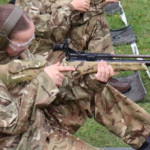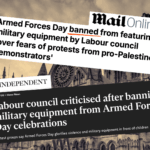Armed forces visits to Scottish schools – a ‘big issue’
ForcesWatch comment
Our petition lodged at Holyrood along with Quakers in Scotland on military visits to schools has taken a significant step forward.
Military recruitment of under-18s debated in Westminster
ForcesWatch comment
We report on the recent debate in Parliament arguing that the age of recruitment to the UK armed forces be raised.
Army life: the other side of the story
ForcesWatch comment

Telling adolescents that they can resolve their need to belong by joining the Army is simplistic and one-sided. The reality is many aspects of army life are potentially harmful, especially to vulnerable individuals. The other side of the story needs to be told. This is a longer version of an article first published by The Huffington Post
Teaching Remembrance: focusing on ‘why?’
A history teacher from Coventry got in touch with ForcesWatch to share her experience of teaching Remembrance to year nine classes this year after reading the resource Rethinking Remembrance in Schools: 'Teaching about Remembrance this year was a vastly different experience for me than previous years'.
Scottish petition makes headway
ForcesWatch comment
Members of the Scottish Parliament have agreed to seek further evidence on our joint petition – with Quakers in Scotland – calling for greater scrutiny and guidance around military visits to schools.
The British Legion wants us to ‘Rethink Remembrance’ but they are not the only ones
ForcesWatch comment
The Royal British Legion is asking the public to 'Rethink Remembrance'. Can we remember without obscuring the realities of war and overlaying this important act with militarism?
Tory boost for cadets in schools needs fighting
ForcesWatch comment
This article was first published in the Morning Star
The Defence Secretary, Michael Fallon, recently announced that 25 out of 150 proposed new school cadet units would soon be opening. Despite the presentation of this development as new policy, the Cadet Expansion Programme promoting cadet forces in state schools, was first announced in 2012. While the Government heralds the cadets as a silver bullet in terms of improving pupil attainment and development, the sight of ranks of pupils as young as 12 in military gear and handling weapons will ring alarm bells for many. That this is happening within education raises additional concerns.
Scottish Parliament asks for more information on military visits to schools after hearing from ForcesWatch
ForcesWatch comment
Back in March we asked Holyrood to ensure ‘guidance is provided to schools', ‘information is collected to provide public monitoring’ and ‘parents/guardians are consulted’ when it comes to visits by the military. Last week we gave evidence to the Public Petitions Committee.
Armed Forces Day: ‘It is peace we must strive for, not increasing militarisation’
ForcesWatch Comment
This letter from ForcesWatch staff member Douglas Beattie was first published in the Camden New Journal on 23 June 2016 in response to Camden Council's support of Armed Forces Day.
Making the link with child development
ForcesWatch Comment
Are 16 and 17 year olds developmentally mature enough to make rational decisions about enlisting and once they have joined? The Chair of Neurology at the University of Pennsylvania says: 16 years olds "may be more prone to being stressed, to maybe malfunctioning under stress and also not using more rational a decision making approach when they are in that split second."






